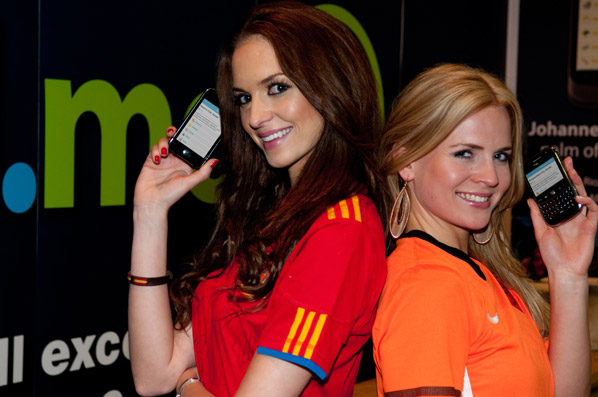Mobile internet – the essential World Cup travel tool

Mobile internet technology came of age at this year’s World Cup in South Africa, with sites such as capetown.mobi, joburg.city.mobi, pretoria.mobi. How will the newly-announced hosts of the 2018 and 2022 World Cup, Russia and Qatar, benefit from mobile internet communication?
Sports tourism is a US$600 billion a year industry and this presents massive opportunity for marketeers and brands to tap into a passionate and information-hungry crowd. For football fans visiting South Africa last summer, the World Cup provided endless opportunities to use mobile as a way to connect, communicate and share.
For football fans it is essential that they have access to updated football scores and the latest World Cup news though a medium that can be accessed at anytime and from anywhere and mobile fits this profile perfectly.

(World Cup contenders: Miss Spain and Miss Holland using city.mobi guides at Fifa 2010 in Johanessburg, South Africa)
In the crowded mobile internet market, the only winners in South Africa last summer were those sites that provided fans with essential info to enjoy the World Cup – travel, entertainment and accommodation all at their fingertips.
This included the free mobile service city.mobi– the leading mobile travel guide to over 600 destinations worldwide – which established itself as the perfect platform for mobile advertisers to reach this engage audience.
 City.mobi provides detailed information about accommodation, attractions, dining, city guides, and transport information tailored for users on the go.
City.mobi provides detailed information about accommodation, attractions, dining, city guides, and transport information tailored for users on the go.
During the World Cup the host cities on city.mobi offered live mobile scores, group standings, and match schedules. These cities include
Durban (durban.city.mobi ),
Port Elizabeth (portelizabeth.city.mobi ),
Bloemfontein (bloemfontein.mobi ),
Johannesburg (joburg.city.mobi ),
Pretoria (pretoria.mobi ),
Nelspruit (http://nelspruit.city.mobi ),
Polokwane (polokwane.city.mobi ), and
Rustenburg (rustenburg.city.mobi ).
Alongside the Olympics, the Fifa World Cup is one of the most watched sporting events in the world and mobile internet users (450 million mobile internet users worldwide in 2010).
The convergence of social media platforms with arguably the most community based event in the world has created a mobile marketers dream.
SMS marketing at football events around South Africa also proved a highly-effective strategy for mobile marketers during the World Cup. SMS marketing enjoys one of the highest response rates in digital marketing business due to its high relevancy and OPT-IN procedures.
As the eyes of the World turn to the 2014 World Cup in Brazil, mobile marketers will be looking to sites of host cities, including Rio de Janeiro (rio.mobi), Brasilia (brasilia.mobi), Belo Horizonte (belohorizonte.mobi) and Sao Paulo (saopaulo.mobi) to promote their services.

